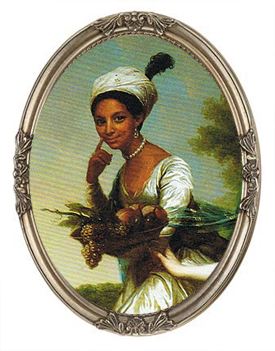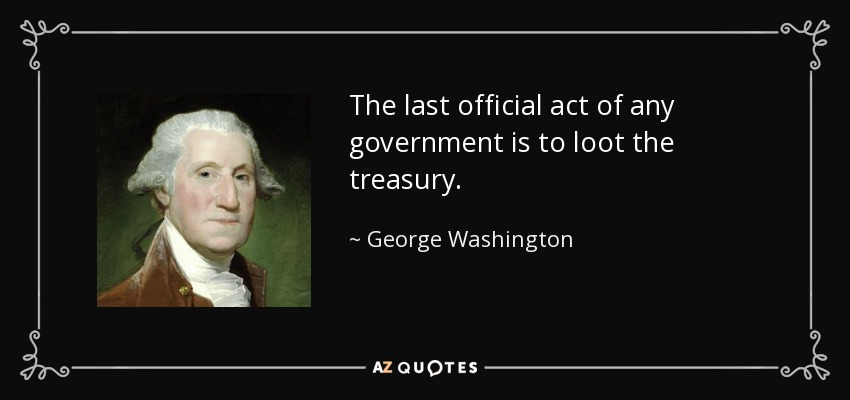| "No compact among men... can be pronounced everlasting and inviolable, and if I may so express myself, that no Wall of words, that no mound of parchment can be so formed as to stand against the sweeping torrent of boundless ambition on the one side, aided by the sapping current of corrupted morals on the other."--George Washington, draft of First Inaugural Address, April 1789 |
Forrest McDonald's George Washington: Today’s Indispensable Man:
As a soldier he was capable of rashness and poor judgment. He was addicted to gambling, indulged in a good deal of wenching, and was said to be a “most horrid swearer.” He was vain, a bit pretentious, and hot tempered; and though he was a perfect gentleman in public, he was sometimes not in private.
Yet he was respected, admired, even revered by his countrymen, and he was the most trusted man of the age. What is more, and different, he was the most trustworthy man. Why he was so trusted and came to be so trustworthy—in revolutionary circumstances of a kind that almost invariably breed Caesars, Cromwells, Castros, and Stalins—are questions that must be examined if we are to understand Washington’s true legacy.
"If he does that, he will be the greatest man in the world."--King George, upon hearing from painter Benjamin West that the victorious General Washington was voluntarily relinquishing power.
"The basis of our political systems is the right of the people to make and to alter their Constitutions of Government. But the Constitution which at any time exists, 'till changed by an explicit and authentic act of the whole People is sacredly obligatory upon all."--Pres. Washington's Farewell Address, September 19, 1796
"Moving in his own orbit he imparted heat and light to his most distant satellites; and, combining the physical and moral force of all within his sphere, with irresistible weight he took his course, commiserating folly, disdaining vice, dismaying treason, and invigorating despondency; until the auspicious hour arrived when, united with the intrepid forces of a potent and magnanimous ally, he brought to submission the since conqueror of India; thus finishing his long career of military glory with the luster corresponding to his great name, and in this, his last act of war, affixing the seal of fate to our nation’s birth.
First in War, first in Peace, and first in the hearts of his countrymen, he was second to none in humble and enduring scenes of private life. Pious, just, humane, temperate, and sincere; uniform, dignified, and commanding; his example was as edifying to all around him as were the effects of that example lasting. . . . Correct throughout, vice shuddered in his presence and virtue always felt his fostering hand. The purity of his private character gave effulgence to his public virtues."--Washington's Eulogy, written by Justice John Marshall and delivered by Gen. Henry Lee
"Posterity will talk of Washington as the founder of a great empire, when my name shall be lost in the vortex of revolution."--Napoleon Bonaparte
Lincoln on Washington:
"Washington is the mightiest name on earth — long since mightiest in the cause of civil liberty; still mightiest in moral reformation. On that name, an eulogy is expected. It cannot be. To add brightness to the sun, or glory to the name of Washington, is alike impossible. Let none attempt it. In solemn awe pronounce the name, and in its naked deathless splendor, leave it shining on.".......
Following his address Washington studied the faces of his audience. He could see that they were still confused, uncertain, not quite appreciating or comprehending what he had tried to impart in his speech. With a sigh, he removed from his pocket a letter and announced it was from a member of Congress, and that he now wished to read it to them. He produced the letter, gazed upon it, manipulated it without speaking. What was wrong, some of the men wondered. Why did he delay? Washington now reached into a pocket and brought out a pair of new reading glasses. Only those nearest to him knew he lately required them, and he had never worn them in public.Then he spoke: "Gentlemen, you will permit me to put on my spectacles, for I have not only grown gray but almost blind in the service of my country." This simple act and statement by their venerated commander, coupled with remembrances of battles and privations shared together with him, and their sense of shame at their present approach to the threshold of treason, was more effective than the most eloquent oratory. As he read the letter to their unlistening ears, many were in tears from the recollections and emotions which flooded their memories. As Maj. Samuel Shaw, who was present, put it in his journal, " There was something so natural, so unaffected in this appeal as rendered it superior to the most studied oratory. It forced its way to the heart, and you might see sensibility moisten every eye."Finishing, Washington carefully and deliberately folded the letter, took off his glasses, and exited briskly from the hall. Immediately, Knox and others faithful to Washington offered resolutions affirming their appreciation for their commander in chief, and pledging their patriotism and loyalty to the Congress, deploring and regretting those threats and actions which had been uttered and suggested. What support Gates and his group may have enjoyed at the outset of the meeting now completely disintegrated, and the Newburgh conspiracy collapsed."--Excerpts from George L. Marshall, Jr.: The Rise and Fall of the Newburgh Conspiracy--How General Washington and His Spectacles saved the Republic .......
 |
| Medical experts killed Pres. Washington with bloodletting, just as medical experts kill people with vaccines today. The difference is, back then they were just ignorant, not power-mad and greedy like today. And no one censored other dissenting doctors for telling the truth about the dangers of these experimental treatments. Therefore, Real Science was able to bring this Mad Science into the light and end it. |
Churchill: "George Washington holds one of the proudest titles that history can bestow. He was the Father of his Nation. Almost alone his stanchness in the War of Independence held the American colonies to their united purpose. His services after victory had been won were no less great. His firmness and example while first President restrained the violence of faction and postponed a national schism for sixty years. His character and influence steadied the dangerous leanings of Americans to take sides against Britain or France. He filled his office with dignity and inspired his administration with much of his own wisdom. To his terms as are due the smooth organization of the federal government, the establishment of national credit, and the foundation of foreign policy.".......

America's first black poetess
His Excellency General Washington

SIR,
Your Excellency’s Most obedient humble servant,
(excerpt:)
Shall I to Washington their praise recite?
Enough thou know'st them in the fields of fight.
Thee, first in place and honors,—we demand
The grace and glory of thy martial band.
Fam'd for thy valour, for thy virtues more,
Hear every tongue thy guardian aid implore!
History Now: "Wheatley’s letter and poem were delayed in reaching Washington, and when he finally replied on February 28, 1776, he began with a formal apology, begging her forgiveness for “the seeming but not real neglect.” After praising her “poetical talents” and thanking her profusely, Washington invited Wheatley to come visit him at his headquarters. Though definitive evidence is lacking, many historians believe Wheatley did travel to Cambridge and met Washington in person, which if true would have been one of the most extraordinary encounters of the entire founding era."

“The alternate domination of one faction over another, sharpened by the spirit of revenge, natural to party dissension, which in different ages and countries has perpetrated the most horrid enormities, is itself a frightful despotism. But this leads at length to a more formal and permanent despotism. The disorders and miseries, which result, gradually incline the minds of men to seek security and repose in the absolute power of an individual; and sooner or later the chief of some prevailing faction, more able or more fortunate than his competitors, turns this disposition to the purposes of his own elevation, on the ruins of Public Liberty.”
But our Scumbag Political Class has rigged the game for so long, that we have the opposite problem; Parties that pretend to oppose each other, when actually they are united together against the People.
In other words, The UNIPARTY.
Almighty GOD; we make our earnest prayer that Thou wilt keep the United States in Thy holy protection... And finally that Thou wilt most graciously be pleased to dispose us all to do justice, to love mercy and to demean ourselves with that charity, humility and pacific temper of mind which were the characteristics of The Divine Author of our blessed religion, and without whose example in these things we can never hope to be a happy nation. Grant our supplication, we beseech thee, through Jesus Christ Our Lord. Amen.

No comments:
Post a Comment